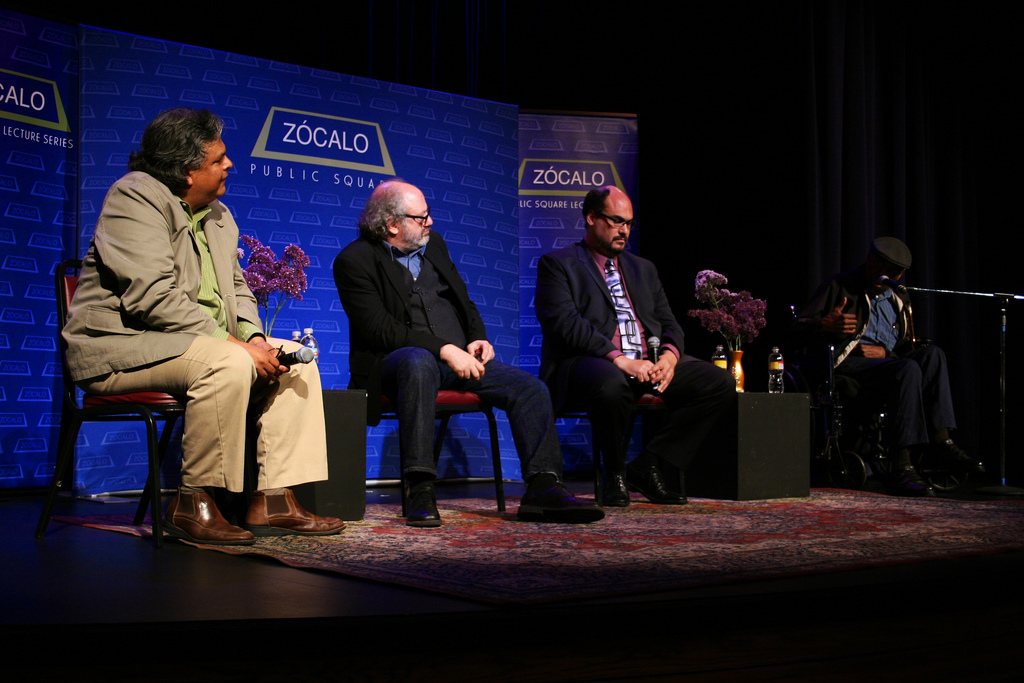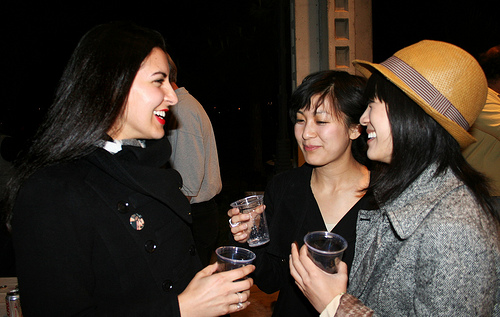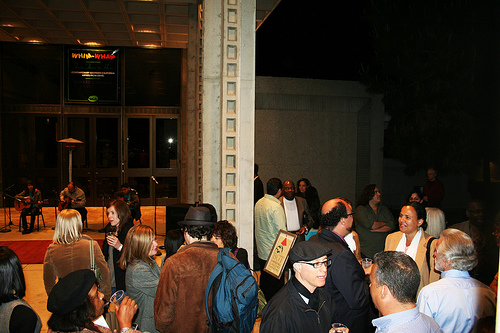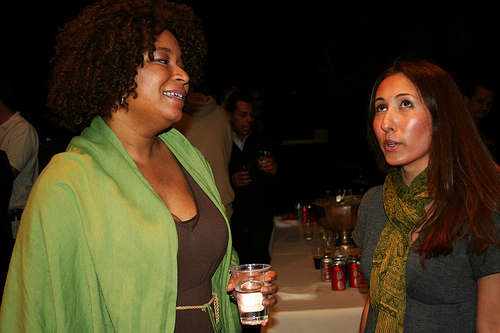
Before he was a legendary jazz bassist and composer, Charles Mingus was known for some different qualities.
William “Buddy” Collette, who at the age of 12 recruited then 11-year-old Mingus for a jazz ensemble, recalled his first encounter with Mingus for the lively crowd at the Barnsdall Gallery Theatre.
“I hope I can get this right – it’s been a long time,” Collette, now 87, joked, before remembering how a friend described young Mingus: “You know Charles Mingus. He plays the cello and he’s bow-legged.”
Collette joined journalist Emory Holmes, record producer Hal Willner, musician Eric Mingus (Charles’ son), and moderator Oscar Garza to reminisce about Mingus and discuss the bassist’s legacy as part of Los Angeles’ year-long celebration of Mingus.
Bread, clothes, chicks
 Mingus’ parents handed him a cello at a young age so he could join his sisters in playing classical music. Lucky for jazz lovers, Collette needed a bassist, and he approached Mingus on the street, promising him “some bread,” “the sharpest clothes,” and “the finest chicks in town,” according to Mingus’ autobiography. If those weren’t persuasion enough, Mingus’ autobiography also recalls Collette saying that race would hold Mingus back in the classical music world. “You can’t slap a cello,” Collette said, “So you gotta learn to slap that bass.” Mingus promptly agreed, and his obliging father traded the cello and paid an extra $130 for a brand new bass.
Mingus’ parents handed him a cello at a young age so he could join his sisters in playing classical music. Lucky for jazz lovers, Collette needed a bassist, and he approached Mingus on the street, promising him “some bread,” “the sharpest clothes,” and “the finest chicks in town,” according to Mingus’ autobiography. If those weren’t persuasion enough, Mingus’ autobiography also recalls Collette saying that race would hold Mingus back in the classical music world. “You can’t slap a cello,” Collette said, “So you gotta learn to slap that bass.” Mingus promptly agreed, and his obliging father traded the cello and paid an extra $130 for a brand new bass.
Mingus played regularly with Collette after getting his bass, and the two became lifelong friends. Collette recalled traveling around Los Angeles with Mingus to play impromptu shows. “People just loved it,” he said. “It’s amazing how you seem to grow if you have an audience. Playing alone at your house or something doesn’t do it. We watched their faces, so we knew that we were doing pretty well.”
They would buy this
Mingus left Los Angeles for New York. Though he always remembered California fondly, Eric said, New York was where Mingus made his name. New York was also where he made his reputation. Willner, who said he likely attended every Mingus performance from 1974 to 1977 in that city and has since produced a Mingus tribute CD featuring everyone from Chuck D to Elvis Costello, also had the fortune of running into Mingus around town. “I’d see him at night walking his dogs,” Willner said, “and he looked like he was seven-foot-five.”
 For Eric Mingus, his father was “very enormous” but also a dad. “When you’re the son of a musician, your dad is basically taking you to the office” when he goes to a show, Mingus said. “You’re like, ‘Oh man, I gotta go with dad to the gig.’”
For Eric Mingus, his father was “very enormous” but also a dad. “When you’re the son of a musician, your dad is basically taking you to the office” when he goes to a show, Mingus said. “You’re like, ‘Oh man, I gotta go with dad to the gig.’”
Mingus’ hot temper became more widely known in New York as well. “He was, by all accounts including his own,” Garza said, “mercurial, angry, demanding.” Collette recalled playing Mingus’ legendary 1962 Town Hall concert – where Mingus pulled together an enormous band, including six bass players, in hopes of making a live recording. It was a rare and difficult undertaking, especially at the time. Mingus insisted Collette be flown across the country for the show. “I knew anytime I’d come where Mingus was, it would be interesting,” Collette said. “You don’t know what’s going to happen.”
At the Town Hall, before a band dressed in tuxedos, Mingus walked on stage wearing “a leather vest, jeans, sandals,” Collette recalled to a laugh from the crowd. Some band members tried to quit the show before it started, Collette said, and Mingus cut off almost every song part way through to say to the audience, “I wouldn’t buy this, would you?” But the crowd, Collette recalled, still wanted more, so much so that they pulled back the curtains the stagehands were trying to close. The recording, badly edited, still won critical praise at its release, and a revised version came out decades later.
Beatles no, hip-hop yes
 As Garza noted, Mingus’ temper made him sometimes misunderstood. The same year as the Town Hall show, for instance, Mingus recorded an album with one of his inspirations, Duke Ellington, during which he stormed out of the studio. But as Eric noted, Charles was “basically horrified that he’d blow it.” And no matter how brutally Mingus replied to a British journalist inquiring whether white Englishmen could play jazz (to put it mildly, he did not think so), he also led one of the earliest “salt and pepper” or mixed-race bands
As Garza noted, Mingus’ temper made him sometimes misunderstood. The same year as the Town Hall show, for instance, Mingus recorded an album with one of his inspirations, Duke Ellington, during which he stormed out of the studio. But as Eric noted, Charles was “basically horrified that he’d blow it.” And no matter how brutally Mingus replied to a British journalist inquiring whether white Englishmen could play jazz (to put it mildly, he did not think so), he also led one of the earliest “salt and pepper” or mixed-race bands
He also had a broad appreciation for music and musicians (except the Beatles, apparently, whom Eric said Mingus “hated”). He would quite like hip-hop, Eric and Willner imagined, and he recorded two cumbia songs (prompting one audience member to jokingly wonder if he was really Carlos Dominguez). Eric, crediting his father’s sensibility with his own pastiche musical style, remembered his father saying, “Why do we have to call it jazz, why do we have to call it classical? Why can’t we just call it music?”
Watch the video here.
See more photos here.
*Photos by Aaron Salcido.




Send A Letter To the Editors